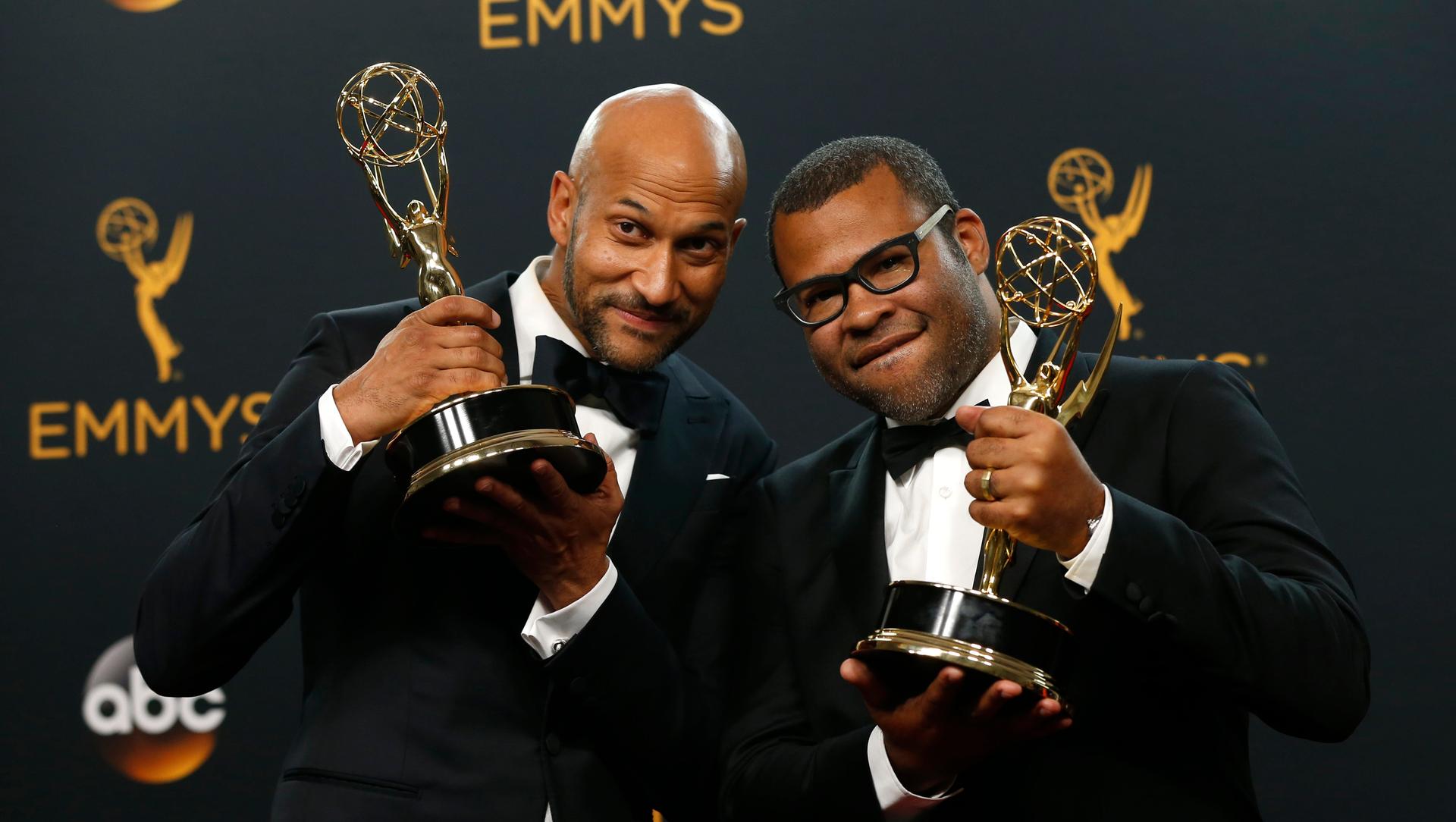‘Get Out,’ with its genre-bending critique of racism, took cues from thrillers about sexism
Keegan-Michael Key (L) and Jordan Peele pose backstage with their award for Outstanding Variety Sketch Series for "Key & Peele" at the 68th Primetime Emmy Awards in Los Angeles on Sept. 18, 2016. Jordan Peele recently released a new film, "Get Out."
In the horror-comedy film "Get Out," a 26-year-old black photographer meets his white girlfriend’s nice, doctor parents for the first time. When he arrives at their house for the weekend, things get a little weird — and then, well, much weirder.
"Get Out" is the first directing effort from Jordan Peele, of the comedy duo Key and Peele. He says using a horror movie to depict aspects of race relations has never been done before.
“We haven't seen this movie. And one of the reasons we haven't is because race is the central theme here, and it's an entertaining horror movie," Peele says. “I wrote the movie with movies like 'The Stepford Wives' and 'Rosemary's Baby' in mind. The way those movies are about gender was a cue to me — like, ‘You know what? You can do this about race.’”
One reason a film like this is so unusual, Peele says, is that Hollywood doesn’t nurture enough black storytellers and filmmakers. “We haven't supported young artists enough to get platforms to tell this type of story with this kind of perspective,” he says. “Producers, the vast majority of whom are white, of course, are real touchy about doing something that deals with themes of victimization of black people and villainization of white people.”
Peele says he made "Get Out" not just to address the lack of black representation in horror movies, but also to convey the sensibilities one finds among black audiences.
“Go to a black neighborhood and watch a horror movie, you’ll hear a lot of people saying, ‘Get out! Get out! Get out! Come on! No, no, no, no!’” Peele says. “So, I wanted to make a movie that sort of addressed that [gap in the action]. In this movie, when the lead doesn't make the smart decision, then at least you understand why.”
In addition to being a scary thriller, the film is also a smart comedy of manners. Bradley Whitford and Catherine Keener play the liberal, middle-aged, well-to-do parents of the woman bringing home her boyfriend. Whitford’s character, naturally, tells their daughter's black suitor, with sincerity, that he would have voted for Barack Obama a third time. The joke comes around twice and gets an even bigger laugh the second time.
“These are the most ideal Caucasian in-laws this guy could ask for,” Peele says with a laugh. “So, part of this movie is to show that even in these seemingly harmless conversations, being on the other side of them, they add up. And they add up to a clue that even in the most progressive environments, people still see the world in terms of race.”
Peele sees comedy and horror as "the shining twins of genres." “For my money, they both depend on a certain amount of groundedness, a certain amount of reality. Something is only going to be as funny as it is applied to reality or true emotion. Something is only going to be as scary as it feels like it exists in this real world.”
Ultimately, it’s all meant to be in good fun, Peele adds. “I didn't feel persecuted by 'Rosemary's Baby' or 'The Stepford Wives,' even though I'm a man,” he says. “I think the real takeaway for me is that, if you are somebody who relates to Chris’s journey, you'll finally see this perspective in a film and you'll recognize it and you'll realize, ‘How come I’ve never seen this?’ If you are a stranger to this journey, well, that's the power of stories: You get to live in this other character’s perspective. That to me is a very powerful thing, and I think it promotes empathy.”
This article is based on an interview that aired on PRI’s Studio 360 with Kurt Andersen.
